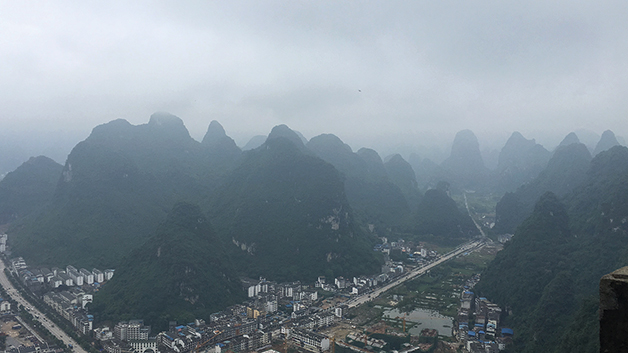Te Rangitaki a Te RanuiEat noodles, find husband…
Sept 30, 2016

The ongoing adventures of Ranui Ellison-Collins in Shanghai
Nā Ranui Ellison-Collins
 The more time I spend exploring this city, the more I believe that Shanghai is simply a large city like any other – sky-high buildings, constant flows of people in a hurry, traffic jams and so on. It’s not the city itself that makes this place seem foreign, it’s the culture.
The more time I spend exploring this city, the more I believe that Shanghai is simply a large city like any other – sky-high buildings, constant flows of people in a hurry, traffic jams and so on. It’s not the city itself that makes this place seem foreign, it’s the culture.
In venturing outside Shanghai I found a new side of China that I had never imagined existed. In all honesty, I don’t know what I expected, but it certainly wasn’t what I discovered. I have now traveled to a few places and have found that each has their own flavour, dialect, and beauty that differentiates them from the next. Shanghai, for instance, is a heavily developed city, with a relatively flat landscape and a dialect of its own – Shanghainese, which is very different to Yangshuo, a south central resort town with very few buildings over four stories high, surrounded by stunning mountains, and sporting a southern dialect.
I have also come across things that I find slightly more difficult to get my head around. Without a doubt there is a version of manaaki here, however, where it applies seems to vary.
Thankfully the language isn’t as daunting as first thought. Don’t get me wrong, it certainly has its challenges – like any new language – but every day is a new day to practice and improve. Mandarin has several layers – how to say a word, the tones which allow you to differentiate words based on pronunciation, and how to read and write the characters. Initially I thought the characters would be the most difficult: I was wrong, it’s the tones, and more so combining multiple tones in the correct way to say a single word, let alone a sentence. The more I learn, the more I understand why I previously thought that Chinese was such a harsh-sounding language – the fluctuating tones, and in particular the fourth tone which can give the impression of an argument.
We discussed this during class, and towards the end our teacher began to understand why our pronunciation was perhaps not so accurate – it’s because we don’t want to sound impolite – rather than poor pronunciation. In preparing for my recent exams, I had to deliver a speech in Chinese, and when practicing over FaceTime I found myself asking the person on the other end if it sounded weird and foreign to them, because it no longer sounded foreign to me. I no longer think of the language as a factor that makes this place feel different – it’s the culture that makes my time here all the more interesting.

By culture I mean how people behave relative to my cultural norm. On an average day I’ll come across any number of small, amusing differences such as long cotton pyjamas seeming to be an acceptable outfit to leave the house in, pedestrian crossings appearing to be more or less a guideline when crossing the street, a standard elevator apparently being suitable for 15-plus people, and people staring at me because of my curly hair, not only because I am a foreigner. The list goes on.
I have also come across things that I find slightly more difficult to get my head around. Without a doubt there is a version of manaaki here, however, where it applies seems to vary. It’s definitely refreshing to see people giving up their seat on the subway for kaumātua, or parents with young children, but the same manaaki doesn’t apply when boarding the subway, where pushing is not only normal, but in some cases, essential. Manaaki in the sense that our teachers will take time out of a lesson to help students book a train for the upcoming holiday, give directions to a post office or bank, or answer phone calls from random numbers – all of which I greatly appreciate because they are non-examinable.
I don’t think I’ll ever be able to accurately explain even half of the encounters I have had here but I am beginning to understand why things may be the way they are. Thankfully I also have a few Chinese friends who are more than happy to explain things to me, set me straight, and also have an interest in knowing what my country is like. Although I’m yet to find a polite way to ask about the strange smells, driving and spitting.
The overall feeling I get from a place arises not so much from its appearance, but more from the people. China still feels a little bit unfamiliar, but has never been so different that I have felt isolated. I don’t think I will master the language in the next six months let alone the culture, but I have had a small taste and gained some understanding. It’s all part of the experience, and each time I find myself understanding a little bit more, that’s enough to keep me motivated to continue learning – or become completely confused – it could go either way.
Ranui Ellison-Collins (Ngāi Tahu- Ōtākou) is a recipient of an Agria-Hōaka scholarship and will spend the next 12 months in Shanghai learning Mandarin.